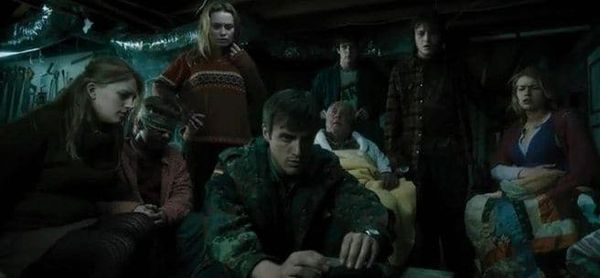Eye For Film >> Movies >> Aftermath (2012) Film Review
Aftermath
Reviewed by: Jennie Kermode

Back in the 1980, European cinema was briefly saturated with what-if-the-worst-happens nuclear holocaust scenarios, most of them unrelentingly bleak in their outlook; the US' brief excursion into the genre with The Terminator actually one of the most positive perspectives on that scenario. In recent years, perhaps thanks to the influence of the World Trade Centre attacks, we have seen the US reinvent the genre, adding extra guns and shouting. This macho take on despair was recently exemplified in The Divide, starring Michael Biehn, and Aftermath sees another erstwhile Terminator series star, Edward Furlong, similarly hold up in a basement with strangers. This film has, if anything, an even bleaker view.
It's fair to say that Furlong has not retained the charisma he had as John Connor, nor achieved Biehn's level of entertaining, cultivated ham. Oddly enough, he has retained the baseball cap that he seems to be wearing in all his films these days, along with what looks like the same shirt and many of the same personality traits. This isn't too much of a problem as we're not supposed to like him, at least not right away. He's a small town guy with a pregnant wife who takes the apocalypse personally. He also resents the arrival in his neighbour's basement refuge of a young doctor plus the women and child the doctor has rescued on the road, but even he has to acknowledge that a doctor could be useful, and the group has brought its own supplies. So they seal themselves in, following the routine we know well by now - trying to keep at bay the worst of the radioactive fallout - and try to get along.

Aftermath's strongest sequence is its opening, as the crisis unfolds and everybody speeds to shelter. The breakneck pace of this does a good job of building up adrenaline and crating a sense of high drama that lingers even when the story slows down. It also establishes the doctor (C.J. Thomason) as a character who actually understands the situation and knows what he's doing, which is always a relief in such stories and instantly dispenses with need or a number of annoying and too-common narrative tangents. He makes a likeable lead and works effectively within the story because his professional calm and optimism keep us hoping against hope that these people might make it. There are nine of them altogether, but sadly most of them are not as successfully developed. The only other actor who really makes an impression is Ross Britz as awkward but endearing geek Jonathan, refreshingly focused on ideas instead on angst and developing a muted emotional response to the tragedy whose intensity takes some time to become apparent.
The scenario leading up to the nuclear disaster, which is presented to us in snippets on the radio, will seem self-centred and twee to most non-Americans, but is easy enough to overlook in the context of what follows. The script isn't really strong enough to make the most of the potential its tapped protagonists offer, and too often looks for tension in the wrong places, relying on external factors like the desperation of other survivors (most of whom seem to be bigger and stronger despite the fact they've spent more time outside), thereby weakening the suspense. Still, the humanity it brings to its characters is refreshing for the genre, as is its unadorned realism. Whilst it doesn't come close to the bleakness of real life scenarios like that shown in After The Apocalypse, it ultimately sets aside the axe-wielding and gunplay for far more potent horrors.
Reviewed on: 17 Jul 2014















